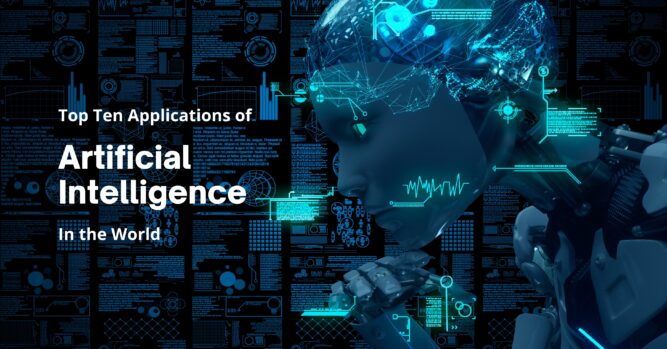
Artificial Intelligence (AI) is transforming industries across the globe, revolutionizing the way we live, work, and interact. AI applications drive efficiency, innovation, and productivity from healthcare to finance. In this article, we explore the top ten applications of AI that are making a significant impact worldwide.
The top ten applications of Artificial Intelligence in the world demonstrate the versatility and transformative power of AI technology. These applications are not just theoretical; they are actively reshaping industries, enhancing services, and improving outcomes in various fields. By understanding these top ten applications of Artificial Intelligence in the world, businesses and individuals can better appreciate the scope and potential of AI.
Furthermore, the integration of AI into everyday operations has led to significant advancements and innovations. From streamlining complex processes to offering unprecedented levels of customization and precision, the top ten applications of Artificial Intelligence in the world highlight how AI is becoming an indispensable tool in addressing contemporary challenges and driving future growth.
1. AI in Healthcare
Artificial Intelligence enhances patient care through predictive analytics, personalized treatment plans, and robotic surgeries. Machine learning algorithms can analyze vast amounts of medical data to predict disease outbreaks and assist in early diagnosis.
2. AI in Finance
The financial sector leverages AI for fraud detection, algorithmic trading, and personalized banking experiences. AI-driven chatbots and virtual assistants provide 24/7 customer support, while machine learning models analyze market trends to optimize investment strategies.
3. AI in Transportation
Self-driving cars and AI-powered traffic management systems are revolutionizing transportation. Autonomous vehicles use AI to navigate and make real-time decisions, while smart traffic lights reduce congestion and improve road safety.
4. AI in Retail
AI is transforming the retail industry through personalized shopping experiences, inventory management, and demand forecasting. Retailers use Artificial Intelligence to recommend products, optimize pricing strategies, and streamline supply chains.
5. AI in Manufacturing
AI enhances production efficiency, quality control, and predictive maintenance in manufacturing. Robots and AI-driven machinery automate repetitive tasks, reducing errors and increasing productivity.
6. AI in Education
AI personalizes learning experiences, providing tailored educational content and real-time feedback. Intelligent tutoring systems and AI-powered educational platforms adapt to individual learning styles and needs.
7. AI in Agriculture
AI-driven technologies in agriculture improve crop yield, pest control, and resource management. Precision farming techniques use AI to analyze soil health, monitor weather conditions, and optimize irrigation.
8. AI in Customer Service
AI chatbots and virtual assistants provide instant support and handle routine inquiries, improving customer satisfaction. Natural language processing (NLP) enables these AI systems to understand and respond to customer queries effectively.
9. AI in Marketing
AI analyzes consumer behavior and preferences to optimize marketing campaigns. Machine learning algorithms segment audiences, predict trends and personalize content to enhance engagement and conversion rates.
10. AI inCybersecurity
AI enhances cybersecurity by detecting and mitigating threats in real time. Machine learning models identify unusual patterns and anomalies, providing proactive defense against cyber-attacks. Discover AI’s impact on cybersecurity
In conclusion, the applications of AI are vast and continually expanding, driving innovation and efficiency across various sectors. As AI technology evolves, its potential to solve complex problems and improve our daily lives becomes increasingly evident. Embracing AI can lead to groundbreaking advancements and a more prosperous future.

Most Commented